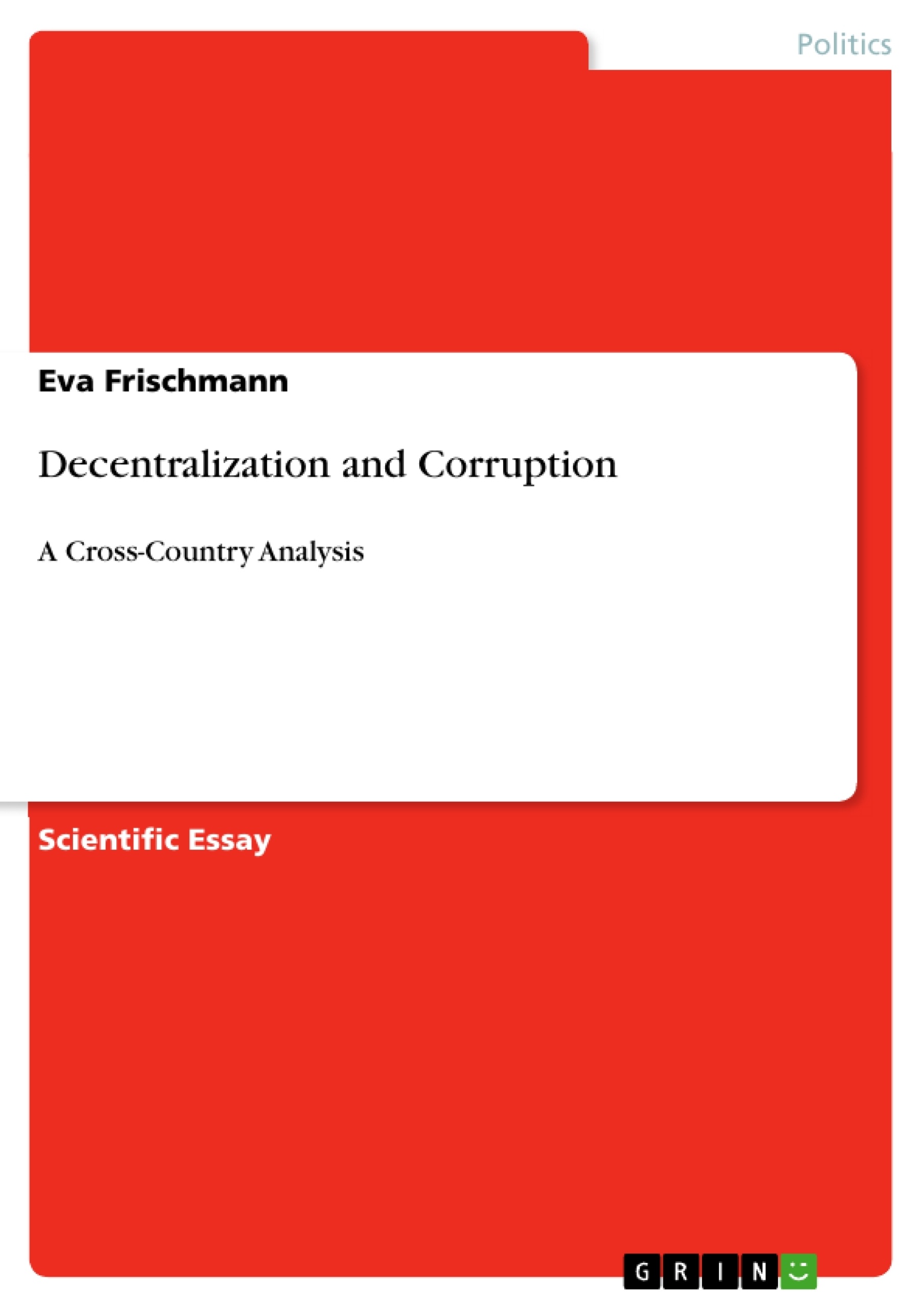Corruption is one of the most widespread political problems throughout the world. Decentralization, in contrast, is considered by many to be one of the most helpful ways to improve a country's economic performance. Nevertheless, only recently have scholars began to look at a possible linkage between the level of decentralization in a country and its level of corruption. Up to now, theoretical insights and empirical evidence in this emerging debate remain both rare and highly contested.
This paper aims at contributing to the debate in two ways. On the one hand through challenging and developing several arguments speaking for and against a possible causal relationship between decentralization and corruption; and on the other hand through testing the decentralization-corruption-hypothesis empirically using four different measurements of decentralization. Both parts aim at answering the following question: Is there a causal relationship between a country's level of decentralization and its level of corruption?
Inhaltsverzeichnis (Table of Contents)
- Introduction.
- Theoretical background.
- Defining the key concepts
- Defining decentralization
- Defining corruption
- Literature review
- Lines of argumentation
- Empirical results.
- Theory building
- The accountability-argument.
- The competition-argument..
- Theory testing ....
- Capturing the key concepts........
- Measuring corruption
- Measuring decentralization...
- Empirical analysis
- Procedure ......
- Controls
- Findings
- Conclusion..
Zielsetzung und Themenschwerpunkte (Objectives and Key Themes)
This paper aims to investigate the relationship between decentralization and corruption. It analyzes theoretical arguments and empirical evidence surrounding this topic to answer the key question: Is there a causal relationship between a country's level of decentralization and its level of corruption?
- Defining decentralization and corruption
- Examining the theoretical arguments for and against a link between decentralization and corruption
- Testing the decentralization-corruption hypothesis empirically using four different measurements of decentralization
- Analyzing the findings of the regression analysis and its limitations
- Drawing conclusions about the insights provided by the study and suggesting avenues for future research
Zusammenfassung der Kapitel (Chapter Summaries)
- Introduction: This chapter introduces the topic of decentralization and corruption, highlighting the existing debate and the paper's contribution to it. It outlines the structure of the paper and the research question.
- Theoretical background: This section lays the groundwork for the study by defining the key concepts of decentralization and corruption. It reviews the existing literature and re-examines the main arguments surrounding the relationship between decentralization and corruption.
- Theory building: This chapter develops the theoretical framework of the paper by exploring two prominent arguments: the accountability argument and the competition argument. It analyzes how these arguments relate to the potential causal relationship between decentralization and corruption.
- Theory testing: This chapter outlines the empirical strategy for testing the decentralization-corruption hypothesis. It describes the variables used, the empirical analysis procedure, and the controls included in the study.
Schlüsselwörter (Keywords)
The key concepts and themes explored in this paper include decentralization, corruption, accountability, competition, empirical analysis, regression analysis, and the relationship between political and economic factors.
Frequently Asked Questions
Does decentralization reduce corruption?
The relationship is highly contested. Some argue it reduces corruption by increasing accountability, while others believe it can increase corruption by empowering local elites.
What is the accountability argument?
It suggests that local officials are more closely monitored by their constituents, making it harder for them to engage in corrupt activities without being noticed or voted out.
What is the competition argument?
This argument posits that decentralization creates competition between jurisdictions for residents and businesses, forcing local governments to be more efficient and less corrupt.
How can corruption be measured empirically?
Common measurements include perception-based indices like the Corruption Perceptions Index (CPI) by Transparency International or the World Bank's Control of Corruption indicator.
Why are empirical results on this topic so varied?
Results vary due to different definitions of decentralization (fiscal, political, or administrative) and the diverse socio-economic contexts of the countries being studied.
- Quote paper
- Eva Frischmann (Author), 2010, Decentralization and Corruption, Munich, GRIN Verlag, https://www.grin.com/document/158591



